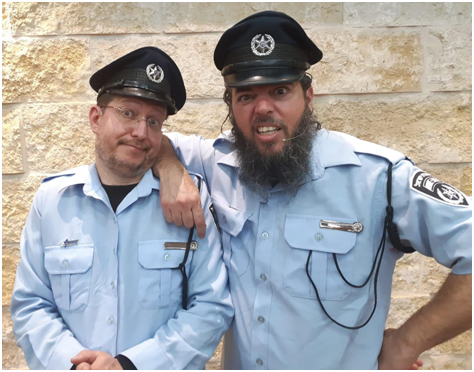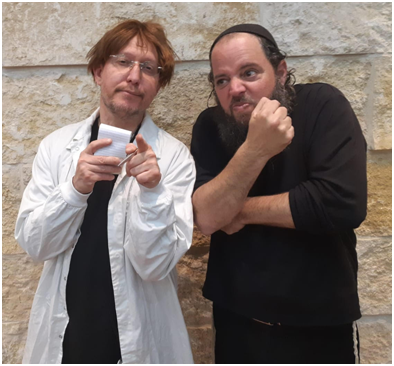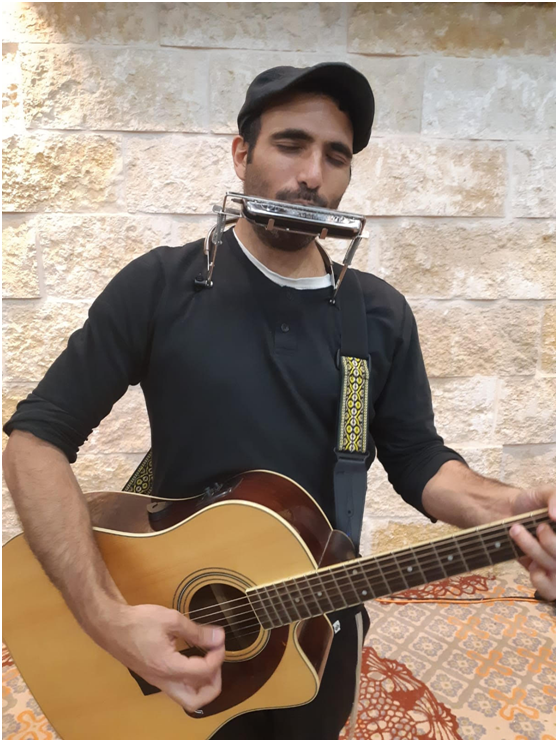"Laugh Without Tarnish": Raviv Zak, Hanan Lederman, and Shani Hayun in a Joint Interview
After years of work on Israel's most well-known shows, Hanan Lederman and Raviv Zak have transformed into observant actors delivering pure content. Now, they join forces with musician Shani Hayun for a collaborative show, confident that "Kosher humor is on a much higher level."
 Three in one pot (from right to left) Hanan Lederman, Raviv Zak, and Shani Hayun (Photos: Courtesy of the interviewees)
Three in one pot (from right to left) Hanan Lederman, Raviv Zak, and Shani Hayun (Photos: Courtesy of the interviewees)What happens when three artists meet on one stage? The answer is provided by actors Raviv Zak and Hanan Lederman, together with musician Shani Hayun. The three are now presenting a new show - 'Three in One Pot', aimed at teenagers and adults, built from skits written and created by the trio during rehearsals that brought up various dilemmas and inspired the final product.
It's hard to pinpoint what is so unique about the show. Maybe it's the kosher humor brought by Hanan Lederman, the stand-up artist and creator who participated in cult series in Israeli culture before returning to observance, or perhaps it's the original music composed by Shani Hayun. It might also be the artistic intuition and humility brought by Raviv. Either way, the stage encounter between the three creators and the desire to convey art and its messages directly makes the audience an integral part of the rehearsals for the show, as Raviv, Hanan, and Shani reveal the backstage workings of theater production. Thus, the audience becomes partners in the creative process, which is built as if in live broadcast.
 The Policemen Herzl A and Herzl B
The Policemen Herzl A and Herzl B
Raviv: "Laugh Without Demeaning Someone Else"
Raviv, a screenwriter and baal teshuva known to viewers of the Hidabroot channel from shows like 'Ap Ap Ap', 'Shmarya', and 'News on Time', has worked in the industry for years. "I was on every possible channel, starring, presenting, assisting with production, content producing, and whatnot," he says. At 35, he began writing. "This show addresses the work on our traits," he shares. "The three of us meet to rehearse for a show about character building, and during rehearsals, which essentially become the show, we talk about resentment, anger, competition, sadness, joy – all the emotions and desires that drive us as humans. The performance incorporates skits and songs and offers ways to deal with intense feelings like anger or jealousy without preaching or moralizing. Our goal is to entertain and create art, but also to bring Jewish values to the forefront, and character building is an essential part of Judaism."
One of the strong messages of the show deals with the question of how we'll be eulogized on our last day. "This question echoes and causes everyone to reflect – is anger or jealousy worth it? When this sinks in, people realize that the work they do today is what they'll be left with, so it’s essential to improve and work on ourselves."
 Shani Hayun and Raviv Zak (left) playing Greek Zorba
Shani Hayun and Raviv Zak (left) playing Greek ZorbaHow do people react to the show?
Raviv: "During one rehearsal, Hanan's wife and my wife, along with some additional viewers, came to visit, and so we performed for a small audience – the responses were fantastic. They were really excited, and we realized we hit the target. We aren't preaching to anyone, nor are we dictating how to fix oneself. In every art form, there is an aim to communicate something beyond the desire to make people laugh, there's also a message, and it's okay if you know how to convey it properly. For example, we have a funny bit about jealousy, where the realization at the end is that someone who wants what another has should understand they need to take the entire package, not just the coveted item. The skits are seasoned with lots of humor, an unmediated tool to engage the audience, and in the musical pieces that Shani created. This guy is a top creator, he plays many instruments, and knows how to translate a moment into music. What he does is art."
Raviv, how do you make people laugh with kosher humor?
"When I used to work in the secular world, it was clear that to make people laugh you had to go low and do dirty humor. Those were the ground rules. We were supposed to find a fault and base a joke on it; there's no such thing as publicly shaming someone. It really bothered me, and one time they returned a skit I wrote because it wasn't mean enough. That’s one of the reasons I decided to leave the industry, because ethically and morally it didn’t align with my path in observance. As a religious creator, you're bound by rules – you mustn't curse or make fun of others, skits need to be kosher and funny - these restrictions actually lead you as a writer to be more creative. We know how to deliver the message, and the audience leaves smiling; yes, you can laugh without belittling someone else."
 Doctor Gilles in treatment
Doctor Gilles in treatmentDo you think there is room for creativity and culture in the Orthodox world?
"A large portion of the Orthodox sector is engaged in Torah study from dawn to night and doesn’t consume culture as much. But there are different levels within the Orthodox sector and space for creativity and culture. We don’t need to compete with other productions, although there is demand – there's a thirst from the public. They definitely want to see performances, and our show stands out with its quality, and the positive reactions reflect that. A grandmother who came to see the show left in tears and moved, she felt we were showing her the truth."
Honestly - do you miss the life before becoming religious?
When I became religious, I understood how fake I was in my secular life, motivated by the desire for others to see me as talented and praise my art. In short, it was being enslaved to your ego. When I joined Hidabroot, after becoming religious, we started filming and I made a mistake – I forgot to bring an item that was needed for the shoot. I was sure I was going to get a serious reprimand because that’s what I was used to. I was shocked by the response of the people I worked with. They simply asked me to bring the item and that was it. I don’t miss that world at all. I was offered a writing position on one of the big shows and still declined. Professionally, I would have wanted the prestige of saying I was a writer for such a major show, but after choosing something else, coming to Hidabroot, it’s worth so much more to me."
Lederman: "Earning Less, Enjoying More"
Hanan Lederman, 50, resides in Bnei Brak, father of seven, was born and raised in Givatayim, and participated in productions on Israeli television during the 90s. In the late 90s, Lederman became religious and studied at Netivot Olam Yeshiva in Bnei Brak. Today, he lives in Bnei Brak with his family and performs as a comedian and stand-up artist with shows tailored for the Orthodox community.
Hanan: "The show moves at a very lively and rhythmic pace, live music accompanies the skits - there are hardly any shows like this. Those who come will see a musical performance that combines humorous skits, and the audience is showing their approval. At the end of one show, a rebbetzin, an Orthodox woman, told us she encountered a situation where she was about to get angry, but remembered a song from the show: 'Mo, Mo my head's in the tar, reality chases you,' and she just started laughing, and the anger disappeared."
You've made a drastic change, from working in the secular world to the industry in the Orthodox world...
"The change was indeed very drastic, but I gained immensely. I often give a metaphorical example that a bank CEO will agree to leave his job for another job where he’ll earn significantly less only if he gains in another respect. I had status in the secular world, but the return to faith I made is my greatest gain. *B"H* I got married, built a home, and I don’t compare myself to others. It’s time to do good, clean work, uplifting, with all the rules of entertainment, in kosher and purity while sanctifying Heaven."
How do you create humor and joy with these constraints?
"You can touch deeper in the soul through true joy. You don’t have to use foul language, and with all due respect, the constraints on a religious creator who has to keep texts clean, take them to higher places. Creating clean humor demands a lot of thought and caution, you're constantly vigilant, it’s more challenging but those constraints build you up. Rabbi Hirsch says that the letters Shin and Tzadi interchange in the words 'simcha' (joy) and 'tzmicha' (growth) - true joy helps you grow, joy is growth. If someone attends an evening of comedy, they’ll laugh until their sides hurt, they saw a performance by someone who knows how to make them laugh, but not necessarily grow. Humor is born from conflict, from something unexpected or a clash of norms – in our show, the audience is taken through many places."
Do you think there's room for culture in the Orthodox world?
"We seek advice from leading rabbis. There's an audience that is fully dedicated to Torah and they’re not whom we're targeting, we're supporting their pursuits. There's another audience that wants to consume culture; they're searching for options, and they want to see kosher humor fitting their worldview."
Do you miss the previous, secular world?
"An artist who's a 'stage animal' feeds off the audience's reactions, essentially becoming a slave to these reactions. A stand-up artist who can't make the audience fall off their seats may become depressed. We strive for something else. True, we aim for the audience to laugh, we desire amusement park energy, the crowd overwhelmingly enthusiastic – but if it doesn’t happen, it’s not a failure, there's perspective. We know everything is in Hashem's hands, we want to put a smile on the face with beautiful means and in a kosher manner."
Shani Hayun: The Show's Mascot
Shani Hayun, 33, resides in Pardes Hanna, a musician who plays several instruments, a graduate student in Jewish music. "Hanan and I met at a lecture, and he suggested we put on a show. I thought it was an off-the-cuff remark. Later, he called, and the rest is history. A significant portion of the show’s content are authentic pieces developed during rehearsals," he shares, "We are playing life. Each of us brings their daily experiences, and the subtext shows that combining forces is far more enriching, evidenced in the artistic collaboration between the three of us."
Shani plays different instruments, and his colleagues call him "the mascot of the show." "Music embeds content perfectly. Music is open-heart surgery, it shoots an arrow straight into the heart; it doesn’t need to wind around and stimulate the listener's intellect; it opens the heart, and then you bring everything in. Rabbi Nachman says you must hear music from a kosher musician because it doesn't matter what they sing about; the listener will absorb a capsule of the musician's personality. That’s why a musical creation is very personal and can be spiritually dangerous. I enter every performance with fear and reverence, praying before that I’ll be worthy to approach the show with a pure heart."
 Shani Hayun playing Hallelujah
Shani Hayun playing HallelujahShani, do you miss the previous world?
"I come from a family that isn't secular but I made my way in the service of God and embarked on a path of return. The process of returning doesn’t diminish one as an artist but empowers. The great return movement of the 70s advocated for abandoning the old world. I believe Hashem has placed within me energies and values that need to be expressed, and returning enhances what a person is given, giving them tools to use those gifts in a more correct, deserving, and powerful way."

